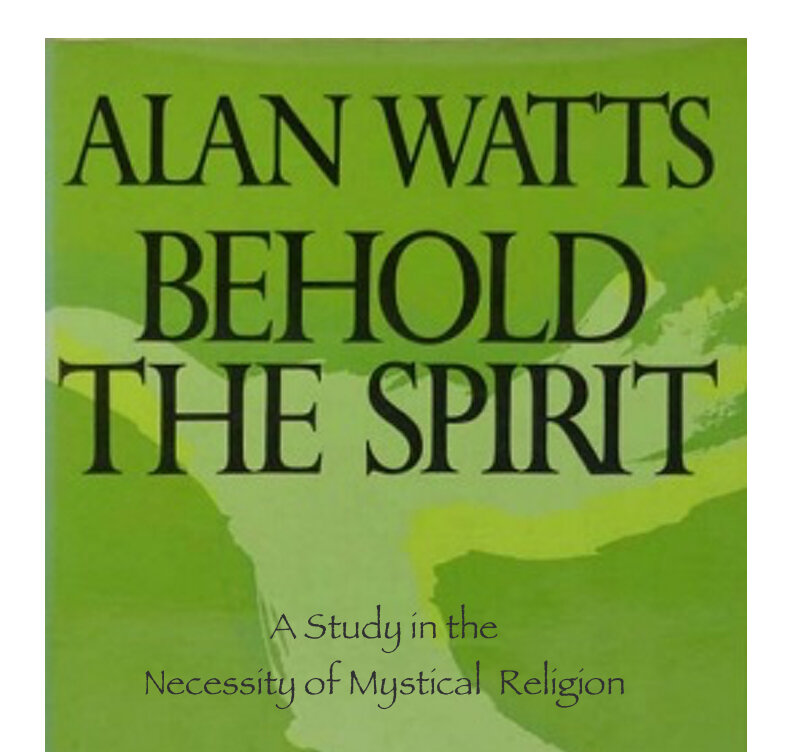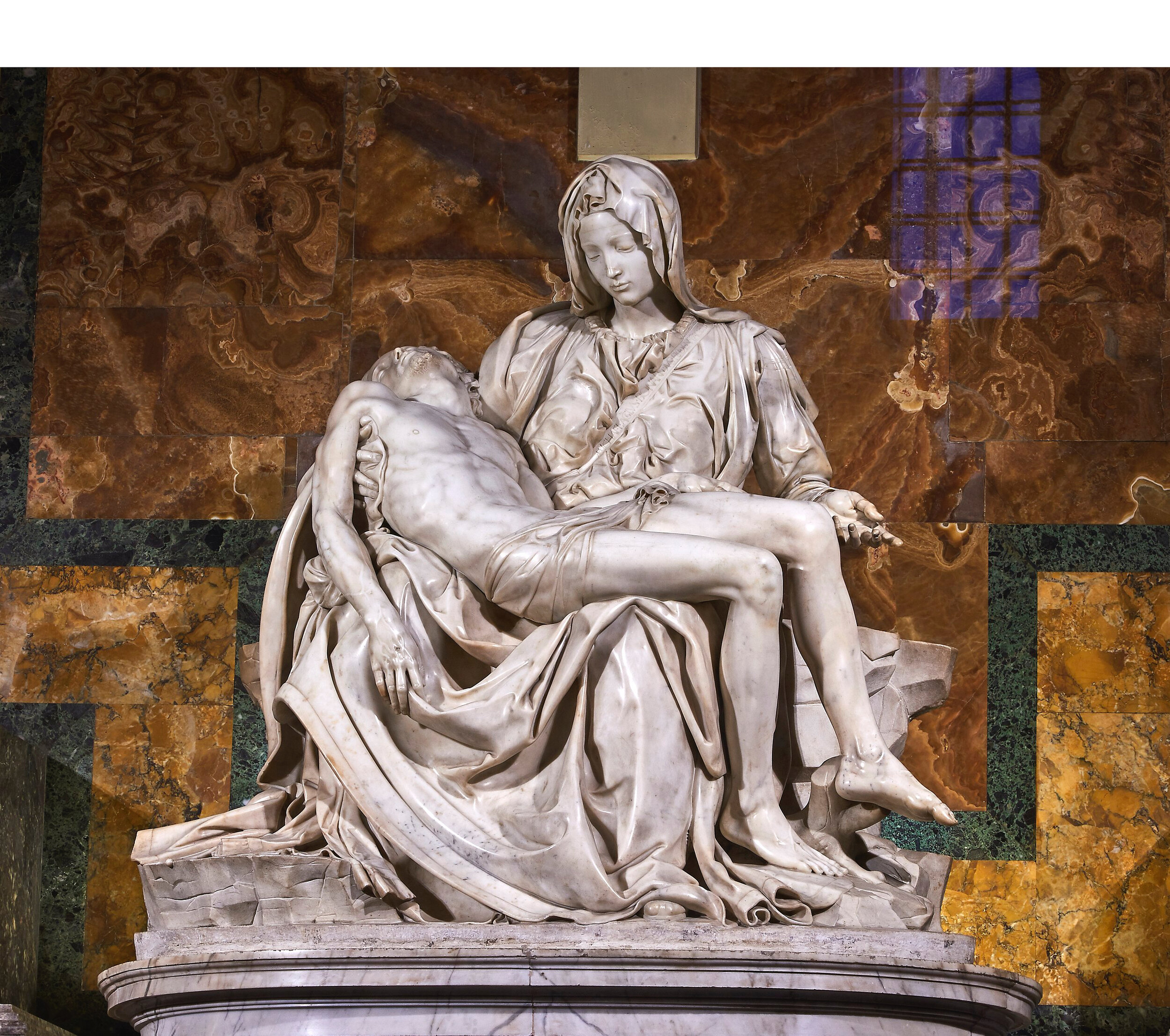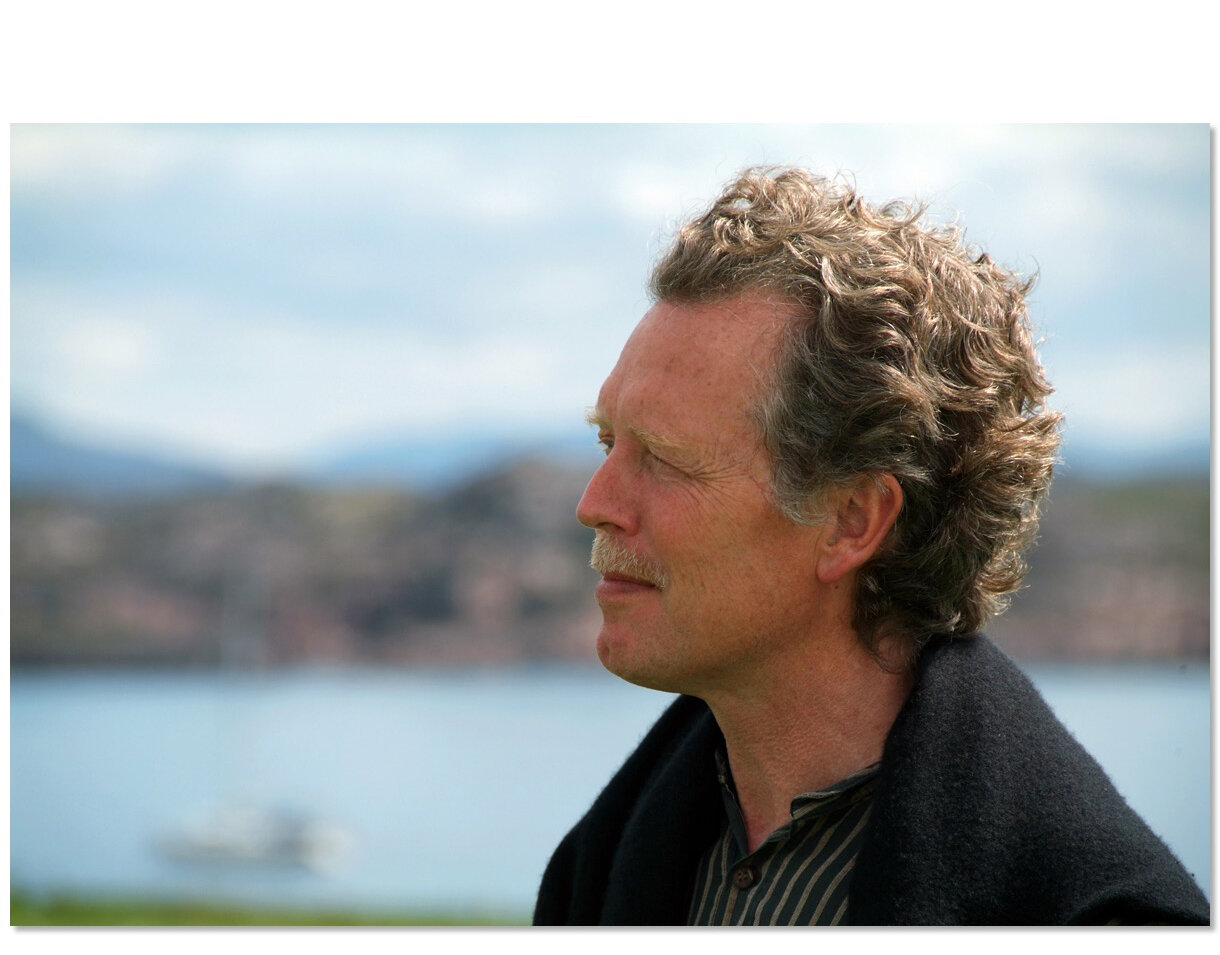
The Illusion of Our False Self by James Finley (second piece is – “Thomas Merton, abridged and adapted from “New Seeds of Contemplation“)
Guest writer and CAC faculty member James Finley continues exploring insights on the true self and false self that he gleaned from Thomas Merton.
In the following text, Merton makes clear that the self-proclaimed autonomy of the false self is but an illusion:
Every one of us is shadowed by an illusory person: a false self.
This is the man I want myself to be but who cannot exist, because God does not know anything about him. And to be unknown of God is altogether too much privacy.

Neil Douglas-Klotz on The Aramaic Jesus by Tami Simon
Tami Simon: You’re listening to Insights at the Edge. Today my guest is Neil Douglas-Klotz. Neil is a world-renowned scholar in religious studies, spirituality, and psychology. He holds a PhD in religious studies and psychology from the Union Institute and taught these subjects for 10 years at Holy Names College in California. Living now in Edinburgh, Scotland, Neil Douglas-Klotz directs the Edinburgh Institute for Advanced Learning. He’s the author of several books including Prayers of the Cosmos, The Hidden Gospel, The Genesis Meditations, and The Sufi Book of Life. With Sounds True, Neil has published three audio-learning courses including the new program, I Am: The Secret Teaching of the Aramaic Jesus. Neil has also written the Sounds True book, Blessings of the Cosmos—which includes a corresponding CD of 20 guided Aramaic body prayers—where he presents a collection of all new translations of Jesus’ best-loved benedictions and invocations for peace, healing, and divine connection.
Tami Simon: You’re listening to Insights at the Edge. Today my guest is Neil Douglas-Klotz. Neil is a world-renowned scholar in religious studies, spirituality, and psychology. He holds a PhD in religious studies and psychology from the Union Institute and taught these subjects for 10 years at Holy Names College in California. Living now in Edinburgh, Scotland, Neil Douglas-Klotz directs the Edinburgh Institute for Advanced Learning. He’s the author of several books including Prayers of the Cosmos, The Hidden Gospel, The Genesis Meditations, and The Sufi Book of Life. With Sounds True, Neil has published three audio-learning courses including the new program, I Am: The Secret Teaching of the Aramaic Jesus. Neil has also written the Sounds True book, Blessings of the Cosmos—which includes a corresponding CD of 20 guided Aramaic body prayers—where he presents a collection of all new translations of Jesus’ best-loved benedictions and invocations for peace, healing, and divine connection.

Buddha at the Gas Pump Interview with Seán ÓLaoire
My guest is Father Seán ÓLaoire. He was born in Ireland and earned a Bachelor of Science degree in Mathematics from the National University of Ireland. He was ordained a Catholic priest in 1972 and spent 14 years working in Kenya. He is multilingual. I think he’d say he speaks about five languages and has an MA and PhD in Transpersonal Psychology. He’s a licensed clinical psychologist in private practice and is the Co-Founder and the Spiritual Director of a nondenominational community called Companions on the Journey, based in Palo Alto, California. He’s the author of five books and co-author of a sixth, and just for kicks, I’ll read the five books: So one is in Swahili, which I’m not going to try to pronounce; that was his first one. Another is Spirits in Spacesuits: A Manual for Everyday Mystics (2003); Souls on Safari (2006), also translated into German; A Sensible God, published in 2008; Why: What Your Life is Telling You About Who You Are and Why You’re Here, published in 2013, and he co-authored that with Matthew McKay and Ralph Metzner; — it’s translated into Korean — and then Setting God Free: Moving Beyond the Caricature We’ve Created in Our Own Image, published in 2021. That’s the one that I just listened to over the past week or two, and I enjoyed it a lot. And that’s probably what we’re mostly going to be talking about today, the topics covered in that book, but I told Seán that he should feel free to bring up anything he’d like to discuss, and we’ll talk about it, and of course, any questions that you all send in, we’ll talk about those, too.
SOURCE: https://batgap.com/sean-olaoire/

What, in God’s Name, is Christ Consciousness? (Part 1) by Seán ÓLaoire
Quite frequently, in homilies, lectures and writings, I use the phrase, “Christ Consciousness.” Some weeks ago, a parishioner asked if I might deliver a full ‘sermon’ on the topic. So, I did; and this blog, in two parts, is the result.
I don’t believe for a moment that Jesus of Nazareth was the only ‘avatar’ to exemplify and teach on this topic. Very similar ideas can be found in the terms, “Buddha nature” (in Buddhism) and “Self-realization” (in Hinduism). And I would claim that even the Christian term “Salvation”, properly understood, is really the same idea. Of course, all of these articulations of the great mystical traditions have been misinterpreted and even abused as control mechanisms. More about that anon.
BE A SUPPORTER OF FR. SEAN O`LAOIRE’S WORK

“Beauty and Spirituality” by Christine Valters Painter
I was initiated into the church of beauty as a young child. Though neither of my parents was religious, we would travel in the summers to my father's native Austria so that we could hike the Tyrolean mountains. There we would stand in wonder and awe, surrounded as we were by massive, snow-capped peaks stretching toward the heavens. In the cities of Europe, too, we would walk with quiet reverence through the sacred space of museums and great cathedrals. The beauty of art and nature called to me.
BE A SUPPORTER OF PATHEOS AND THE ABBEY OF THE ARTS

"The Religious Dilemma: Fundamentalism or Mysticism (the Road Less Traveled)?" by Father Seán ÓLaoire
I’ve never found a satisfactory definition of religion, though I’m certain of its origin, which I take to be the Impulse of Spirit. However, humans have a penchant for screwing up all great ideas. The least deadly screw up, perhaps, is to allow the impulse to stagnate theologically; and the deadliest is to weaponize it.
BE A SUPPORTER OF FR. SEAN’S WORK

“The Unknown” by Jeannie Zandi
When we slip out of the known, into a little gap, we oftentimes feel great discomfort. Let’s say in the middle of daydreaming in class, the teacher calls on you and you have no idea what they are talking about. There’s a gap of “I don’t know,” and a kind of terror that can rise. I should have something to show for myself! What if I’m speaking in front of a group and I don’t know what to say? Oh no! Toddlers seem to survive this all the time as they gaze at each other, taking up space for long periods of time, just there, without content. Despite the fact that there is generally no imminent threat to survival, we are terrified of this gap of “I don’t know,” this moment when we might feel that we don’t have our ducks in a row, when we don’t know what’s going on.

“Exploring the Inner Journey of Kahlil Gibran” by Paul-Gordon Chandler
A hushed reflective silence filled the dark cinema as the world premiere of The Prophet finished its animated adaptation of Kahlil Gibran’s inspiring book of prose poetry. I had journeyed to the Toronto International Film Festival to experience the unveiling of Salma Hayek’s creative production firsthand and was not alone in feeling the power of Gibran’s words and images reaching across the decades, seemingly so apropos in our modern search for connection with “the other.” In speaking to Salma afterwards she explained her motivation in bringing Gibran’s work to life: “I thought it was crucial that we pay further tribute to this man who was an Arab who wrote a book of spiritual philosophy that unites all religions and all countries and all creeds, from many different generations . . .” In that brief comments, Salma captured the essence of Gibran’s inner journey: the deeper he went, the wider his embrace became.
BE A SUPPORTER OF THE WRITINGS OF PAUL-GORDON CHANDLER and THE INTERFAITH OBSERVER

“Embracing Mystery” by Frederic and Mary Ann Brussa
How to make acceptance of mystery a spiritual practice; the first step, let God be God.
Mystery. It's not much in favor these days. Modern consciousness has little respect for the unseen and the unknown. We're much more comfortable with sound bytes from the experts and tidy philosophical or psychological systems that have an explanation for every situation. Television programs us to think that every problem has a solution that can be found in an hour or two, minus the time for commercials.
BE A SUPPORTER OF “SPIRITUALITY & PRACTICE” AND THE GOOD WORK OF FREDERIC AND MARY ANN BRUSSAT

"The Way of the Heart" by Cynthia Bourgeault
From the Christian esoteric tradition, a path beyond the mind
Put the mind in the heart…. Put the mind in the heart…. Stand before the Lord with the mind in the heart.” From page after page in the Philokalia, that hallowed collection of spiritual writings from the Christian East, this same refrain emerges. It is striking in both its insistence and its specificity. Whatever that exalted level of spiritual attainment is conceived to be—whether you call it “salvation,” “enlightenment,” “contemplation,” or “divine union”—this is the inner configuration in which it is found. This and no other.
BE A SUPPORTER OF MS. BOURGEAULT’S WORK

7 Reasons Why Evangelicals Should Read Thomas Merton by Michael Wright
I first learned about Thomas Merton when I skipped chapel at my Christian high school. I started to meet weekly with a kindhearted Bible teacher who looked through my cynicism and saw a desire for a deeper spiritual life. I’m grateful for those conversations—especially the day he told me about a book written by Merton called No Man Is An Island. As I started reading it, I was excited to find a monastic writer with piercing insights into my own inner life and a Christian mystical tradition markedly different from the subculture around me. It was providential timing: I was slipping into depression that would last for years, and Merton quickly became a friend and guide through a spiritual wilderness. So today, in honor of his birthday and his lasting impact on the wayfarers and mystics among us, here are seven reasons why evangelicals should read Thomas Merton:

"Christian Mysticism as a Threat to Papal Traditions" by Hayley E. Pangle
From the Gnostics of the second century to the Waldesians of the thirteenth century, popular religion as practiced outside the structures of the Roman Church challenged the religious authority of the papacy and greatly influenced the decisions it made as it refined doctrines, decrees, and practices that it deemed acceptable to the church. Christian mysticism, although having its roots in the earliest days of Christianity, expanded and intensified in the eleventh through fourteenth centuries in Europe. Several aspects of the mystic Christianity in the Middle Ages challenged the traditions of the church, including the mystics’ theological interpretation of scripture, their graphic visions, and their threat to established gender roles.

“Behold the Spirit” (New Preface) by Alan Watts
This book was written twenty-five years ago, during the experiment of trying to immerse myself in Christianity —to the extent of being a priest of the Anglican Communion, Episcopal Chaplain at Northwestern University, and an examining chaplain for candidates for holy orders in the Diocese of Chicago. Prior to this experiment, indeed since the age of fifteen, my outlook had been Buddhist rather than Christian even though I had been schooled in the heart of the Church of England and had learned a version of Christianity which was not that of this book. In adolescence I had rejected it, but as time went on the study of comparative religion and Christian mysticism suggested a way in which I might operate through the forms and in the terms of the official religion of Western culture. I did not want to be an eccentric outsider, and felt that Catholic Christianity might be taught and practiced as a form of that perennial philosophy which is the gold within the sectarian dross of every great religion.
CONTRIBUTE TO THE ALAN WATTS ORGANIZATION

"Discovering Stillness" - Interview with John Butler (from Conscious TV)
All I can say about this man is, "he is profoundly plugged in," and I'd sit at his side anytime, anywhere!
~Keith
A SPECIAL THANKS TO CONSCIOUS TV FOR THESE INTERVIEWS!

"A Friendship, A Love, A Rescue" by Parker Palmer
“…I stand among you as one who offers a small message of hope, that first, there are always people who dare to seek on the margin of society, who are not dependent on social acceptance, not dependent on social routine, and prefer a kind of free-floating existence under a state of risk. And among these people, if they are faithful to their own calling, to their own vocation, and to their own message from God, communication on the deepest level is possible. And the deepest level of communication is not communication, but communion. It is wordless. It is beyond words, and it is beyond speech and beyond concept.” ~Thomas Merton
— The Asian Journal of Thomas Merton
I met Thomas Merton a year after he died. I met him through his writing and through the communion that lies “beyond words,” met him in the seamless way good friends meet again after a long time apart. Without Merton’s friendship and the hope it has given me over the past forty-five years, I’m not sure I could have kept faith with my vocation, even as imperfectly as I have.
THANKS SO MUCH TO MR. PALMER FOR GIVING US GREAT INSIGHT INTO SUCH A SPECIAL MAN

“Atonement” by Richard Rohr
Two generations ago, the landmark theologian in our tradition (Nazarene), H. Orton Wiley, wrote that the penal substitution theory of the atonement was inconsistent with Wesleyan (Nazarene) theological commitments, and therefore could not be our atonement theory. Franciscan priest and thinker Richard Rohr is also concerned that penal substitution has led western Christianity down very negative pathways. He writes,
“For the sake of simplicity and brevity here, let me say that the common Christian reading of the Bible is that Jesus “died for our sins”— either to pay a debt to the devil (common in the first millennium) or to pay a debt to God the Father [proposed by Anselm of Canterbury [1033– 1109] and has often been called “the most unfortunately successful piece of theology ever written”.
BE A SUPPORTER OF THE CENTER FOR ACTION AND CONTEMPLATION

“Heaven on Earth” by Jeannie Zandi
As the Holy creates the world in each moment, the ground level of its expression is the field of vibration. Everything that you can see, everything that is, is made of vibration. Step back from thought, step back from seeing things as objects, and let yourself notice the hum, the vibration, the sensation of existing, of being. Without definition, without evaluation. It is impossible to be wrong. You just are.
It’s a given. It’s the gift of life. It’s the gift of existence. When we stay very close to this ground of being, this simple ground of presence and sensation, the Holy can create through us of its own accord rather than through our preconceived concepts.
BE A SUPPORTER OF MS. ZANDI’S WORK

"Divine Feminine" by Jeannie Zandi
Not long ago I dreamed friends wanted me to come upstairs from a dark basement to meet some people. I ascended, realizing as I climbed that my pupils were fully dilated as if still in the dark. Reaching the people, my pupils had not changed and I could not see. Moreover, I had no active principle in me, receptively present to the depth of my being, which was bottomless night. At their mercy, I was unprotected even by the veil of a social face. Blind to the lit world and ecstatic, I turned toward them as an ambassador of the gorgeous dark, entirely open and given.
BE A SUPPORTER OF MS. ZANDI’S WORK

"LISTENING: Two Ways Of Listening: John and Peter" by J. Philip Newell
The stream of Celtic spirituality, from Pelagius in the fourth century to George MacLeod in the twentieth, is characterized by the expectation of finding God within, of hearing the living voice of God speaking from the very heart of life, within creation and within ourselves. It is a spirituality that recognizes the authority of Saint John and reflects his way of looking and listening for God. At the decisive Synod of Whitby in 664, where two distinct ways of seeing, represented by the Celtic and Roman missions, came into conflict, the former allied itself to John. Coleman of Lindisfarne argued that the Celtic tradition originated from Saint John, the disciple who was, he said, “especially loved by our Lord.” Wilfrid, on the other hand, argued for the Roman mission, which, he claimed, was based on the authority of Saint Peter, whom he called “the most blessed Prince of the Apostles.” The tragic outcome of the synod was not that it chose the Roman mission but that it neither made room within the church for both ways of seeing or declared that both were firmly rooted in the gospel tradition.
BE A SUPPORTER OF MR. NEWELL’S WORK

"The Sacred Feminine Today" by Llewellyn Vaughan-Lee
Today there is a resurgence of interest in the sacred feminine. The immense popularity a few years ago of Dan Brown’s The Da Vinci Code spoke not just to our enjoyment of a good thriller but also to the mystery of the divine feminine in Western culture, which is the real thread of the book’s chase, from the enigmatic smile of the Mona Lisa to the search for the grail and the heritage of Mary Magdalene. We know now how the feminine mysteries were present in Greek culture and myth, as imaged in the story of Persephone, and enacted for more than 2,000 years in the initiations at Eleusis. In the early Christianity women had spiritual equality, and the significance of Mary Magdalene, the disciple whom Jesus loved more than others, being the first to see the risen Christ, points to the esoteric significance of the feminine. We have also learned how the power of the sacred feminine was repressed by the Church fathers, and Mary Magdalene purposely misidentified as a prostitute.
SOURCE: PLEASE SUPPORT THE HUFFINGTON POST

